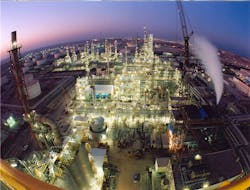Qatar Petroleum’s Mesaieed refinery begins ULSD production
Qatar Petroleum (QP) has completed a project enabling production of ultralow-sulfur diesel (ULSD) at its 137,000-b/d refinery in Mesaieed Industrial City (MIC), about 40 km south of Doha, Qatar.
The MIC refinery began supply of ULSD to Qatar’s domestic transportation market on Sept. 27, ensuring all diesel now sold in the country meets the Euro 5-quality emission standard of maximum 10 ppm sulfur, QP said in a release.
Start of ULSD production at the MIC refinery follows QP’s completion of an upgrading project at the site’s diesel hydrotreating units, the operator said.
“We are pleased to announce this new addition to our products, which supports two of our strategic objectives—continuous efficiency improvements and environmental excellence. The production of ULSD by [QP] is an important milestone for our downstream business,” said Saad Sherida Al-Kaabi, Qatar’s minister of state for energy affairs and QP’s president and chief executive officer.
QP said the refinery’s production of Euro 5-quality ULSD marks an important step and forms an integral part of QP’s goal of maximizing value of Qatar’s downstream businesses and delivering on the company’s commitment to protect and enhance the environment.
While the operator disclosed no further details regarding the MIC refinery’s upgrade of its diesel hydrotreaters, QP previously confirmed it completed preliminary front-end engineering design activities for a proposed upgrading project at the refinery in 2018 (OGJ Online, Apr. 22, 2020).
Designed to improve the refinery’s gasoline production to Euro 5-quality specifications from Euro 3 standards, the planned upgrading project was to involve installation of a new residue fluid catalytic cracker (RFCC) and light-gasoline hydrotreating unit, both of which were due to be completed by early 2020.
The MIC refinery processes a feedstock consisting mainly of crude oil and condensate from Dukhan field, as well as condensate from North field.
About the Author
Robert Brelsford
Downstream Editor
Robert Brelsford joined Oil & Gas Journal in October 2013 as downstream technology editor after 8 years as a crude oil price and news reporter on spot crude transactions at the US Gulf Coast, West Coast, Canadian, and Latin American markets. He holds a BA (2000) in English from Rice University and an MS (2003) in education and social policy from Northwestern University.

